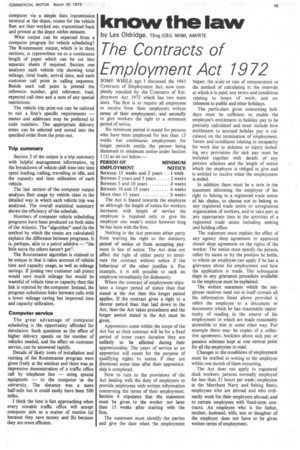know the law
Page 55

If you've noticed an error in this article please click here to report it so we can fix it.
by Les Oldridge, TEng (CEI), MIMI, AMIRTE
The Contracts of Employment Act 19 72
SOME WHILE ago I discussed the 1963 Contracts of Employment Act, now completely repealed by the Contracts of Employment Act 1972 which has two main aims. The first is to require all employees to receive from their employers written terms of their employment; and secondly to give workers the right to a minimum period of notice.
No minimum period is stated for persons who have been employed for less than 13 weeks but continuous employment for longer periods entitle the person being dismissed to minimum notice under Section 1(1) as set out below:— PERIOD OF MINIMUM EMPLOYMENT NOTICE
Between 13 weeks and 2 years . 1 week Between 2 years and 5 years 2 weeks Between 5 and 10 years 4 weeks Between 10 and 15 years 6 weeks More than 15 years 8 weeks The Act is biased towards the employee as although the length of notice for workers increases with length of service the employee is required only to give his employer one week's notice however long he has been with the firm.
Nothing in the Act prevents either party from waiving his right to the statutory period of notice or from accepting payment in lieu of notice. The Act does not affect the right of either party to terminate the contract without notice if the behaviour of the other justifies it. For example, it is still possible to sack an employee immediately for dishonesty.
Where the contract of employment stipulates a longer period of notice than that stated in the Act then this longer period applies. If the contract gives a right to a shorter period than that laid down in the Act, then the Act takes precedence and the longer period stated in the Act must be given..
Apprentices come within the scope of the Act but as their contract will be for a fixed period of some years duration they are unlikely to be affected during their apprenticeship. The years of service as an apprentice will count for the purpose of qualifying rights to notice if they are dismissed some time after their apprenticeship is completed.
Now to turn to the provisions of the Act dealing with the duty of employers to provide employees with written information concerning the terms of their employment. Section 4 stipulates that the statement must be given to the worker not later than 13 weeks after starting with the firm.
The statement must identify the parties and give the date when 'le employment began; the scale or rate of remuneration or the method of calculating it; the intervals at which it is paid; any terms and conditions relating to hours of work; and entitlement to public and other holidays.
The particulars given concerning holidays must be sufficient to enable the employee's entitlement to holiday pay to be precisely calculated and must include how entitlement to accrued holiday pay is calculated on the termination of employment. Terms and conditions relating to incapacity for work due to sickness or injury including any provisions for sick pay must be included together with details of any pension schemes and the length of notice which the employee is obliged to give and is entitled to receive when the employment is ended.
In addition there must be a note in the statement informing the employee of his right to belong to a registered trade union of his choice, to choose not to belong to any registered trade union or unregistered organization of workers, and to take part at any appropriate time in the activities of a registered trade union including seeking and holding office.
The statement must explain the effect of any agency shop agreement or approved closed shop agreement on the rights of the worker. The notice must specify the person, either by name or by the position he holds, to whom an employee can apply if he has a grievance about his employment and how the application is made. The subsequent steps in any grievance procedure available to the employee must be explained.
The written statement which the employee receives need not in itself contain all the information listed above provided it refers the employee to a document or documents which he has reasonable opportunity of reading in the course of his employment or which are made reasonably accessible to him in some other way. For example there may be copies of a collective agreement, booklets about sick pay or pension schemes kept at one central point for all the employees to read.
Changes in the conditions of employment must be notified in writing to the employee within one month of them occurring.
The Act does not apply to registered dock workers; persons normally employed for less than 21 hours per week; employees in the Merchant Navy and fishing fleets; employees who are abroad and who ordinarily work for their employers abroad; and to certain employees with fixed-term contracts. An employee who is the father, mother, husband, wife, son or daughter of the employer does not have to be given written terms of employment.










































































































